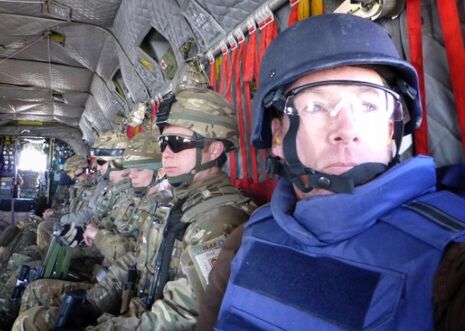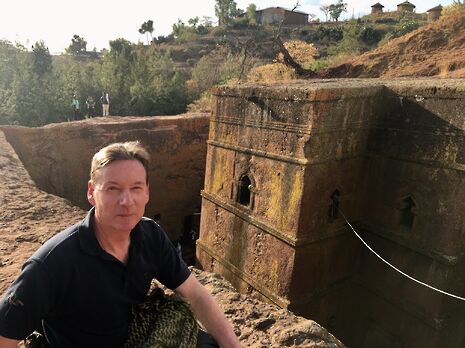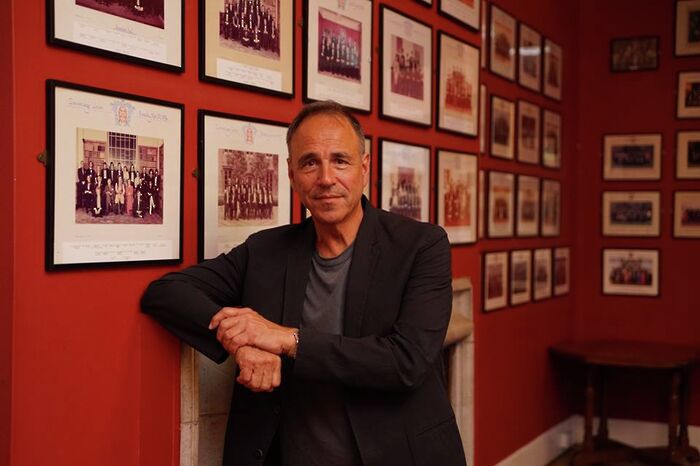Frank Gardner on the ‘imperfect science’ of journalism
The BBC Security Correspondent speaks about dedicating his life to breaking down cultural barriers between the West and the Middle East

Walking into a room in Selwyn College lined with books and filled with late afternoon sun, I am introduced to Frank Gardner. Drinking tea and chatting animatedly with old friends with whom he lived in Egypt, Gardner is friendly, amicable and relaxed. The atmosphere created by the chattering of friends creates an informality that you would not necessarily expect when meeting with the BBC’s current security correspondent.
Gardner’s warmth of tone and grounded nature is striking and present from talk of his daughter’s looming exams to his travels across the globe. He is at once friendly and professional, humorous and intellectual. Moving from serious discussion of the recent US withdrawal from the Iran deal, to recollecting the years he spent in Egypt “laughing there as a student with my Egyptian friends who just taught me so much incredible slang”, Gardner has a profound lightness of touch and likeability.
One of the biggest cliches in the news media is ‘tensions are rising in the Middle East’
The same personable and unrehearsed quality he carries in person also underpinned the talk which Gardner gave for Selwyn College’s annual Ramsay Murray Lecture later in the evening. In a lecture hall packed with students, staff, Cambridge residents and even old friends of Gardner’s, he created a sense of intimacy. Back in the charmingly ornate room at Selwyn College Gardner explains, “I never write lectures, I always just speak ad lib.” With such a strong and prolific career in broadcast journalism, it is little surprise that Gardner knows how to think on the spot while remaining incredibly articulate, calm and poised.
Taking questions from the audience following his talk ‘Behind the Headlines in the Middle East’, Gardner also displays an assured assertiveness. In the response to one audience member’s challenge of the BBC’s coverage of the ongoing Israel/Palestine conflict, Gardner refuted the suggestion that reporters and correspondents are inherently biased in their coverage, stressing the risks reporters take to their lives to bring people as balanced a coverage as possible in the “imperfect science” of journalism.
Gardner himself has been at great risk during his long career as a political correspondent. An 2004 attack in Saudi Arabia carried out by individuals inspired by the terrorist organisation al-Qaida left Gardner in a wheelchair. Several of his colleagues were wounded or lost their lives in the attack. In addition to the emotional toll such an event undoubtedly has on the personal life of any individual, Gardner also describes how “immensely frustrating” the physical effect has been on aspects of his work as a journalist; for example, not being able to cover events such as the Arab Spring protests in Cairo in 2011 from on the ground. Yet, it is notable that his career has been little affected in the long-run due to continued hard work. He continues to report from on the ground where possible, “pushing the envelope as far as [he] can.”

It is not only Gardner’s work life that has continued to thrive despite the events of 2004. Gardner’s personal attachment to, and affection for, the Middle East has remained wholly unscathed; “fair enough I got shot there, but that was pretty unlikely. [It] was wrong place, wrong time.” His striking ability to contextualise his experience is surely a lesson in how to put politics into practice. After dedicating his life to “break[ing] down some of those cultural barriers” between the West and the Middle East, the attack on Gardner’s life has not affected his outlook: “I’ve had so much hospitality and kindness and goodness in the Middle East. I really have.” The sense of affinity, respect and devotion with which he talks about the region leaves little room for doubt.
Indeed, it is the emphatic excitement in Gardner’s tone which makes it almost impossible to not also become enveloped in the rich picture he paints of the diverse peoples and cultures of the region where he has so passionately devoted his career to reporting on. Leaning forward, animated, Gardner hasn’t lost the sense of enthusiasm that inspired him in his youth to study Arabic at the University of Exeter. He relates a turn of phrase which has remained in his mind in particular: a woman shouting in Arabic at her children crossing the road, the translation of which was “watch or the cars will eat you up”. “Isn’t that a lovely way of saying it?” Gardner gushes excitedly.
I note that this sense of childlike curiosity, interest and passion for his ‘subject’ is very much recollective of the qualities I admire in impassioned students here in Cambridge. Slipping in and out of Arabic when relating such phrases and memories to me, it is clear that the love for the Middle East that Gardner has harboured since a childhood encounter with the Arabian explorer Sir Wilfred Thesiger remains as strong as ever. This passion is what has driven him to attempt to continue to change the way people see the region, from popular opinion to the media. So, what does lie ‘Behind the Headlines’?
Trump withdrawing from the Iran deal “drives a wedge right down the middle of the Atlantic between Washington and the rest of Europe
“It is not a region that is stocked full of people burning flags and waving guns and chanting things,” Gardner sighs. Of course, he asserts, “it would be crass of me to downplay some of the very deep problems in the Middle East and some of the conflicts”, giving both Syria and Yemen as “obvious examples”; however, Gardner seeks to add nuance to the one-dimensional idea that the lives of individuals in the Middle East consist solely of religion, conflict and disruption. This is an idea perpetuated by striking and simplistic headlines: “one of the biggest cliches in the news media is ‘tensions are rising in the Middle East’. You know, you never hear anybody saying tensions are subsiding in the Middle East. They can’t always be rising!”
It is this point which is the backbone of much of his talk later in the evening, highlighting “the truth [which] is that for 90 plus per cent of the Middle East today nothing happened.” The media and political narrative Gardner seeks to question is in the hope to highlight the common humanity between lives in different parts of the globe; “all the things that that matter to us also matter to people over there.” For Gardner, understanding this is key to understanding and appreciating the world.
We move onto discussion of more contemporary affairs. “The deal did exactly what it was supposed to do,” explains Gardner, speaking of the Iran deal from which President Trump has recently withdrawn. Gardner laments the action on the part of the US: “My immediate reaction to it is this is disastrous on many levels because it empowers the hardliners in Iran, it sends out a message that you can’t trust the United States or the West, that you cannot do a deal with them.”
Reflecting on the possible international ramifications, Gardner confirms my observation that the decision to withdraw from the deal “drives a wedge right down the middle of the Atlantic between Washington and the rest of Europe”. Ending on a somewhat prophetic note, Gardner adds “and you can guess who’s delighted about that? Moscow.” This pithy end again leaves me struck by his capacity as a reporter, something you can forget somewhat as he reflects on personal memories of the places he has travelled to, lived in, reported on and loved. His favourite place in the region? “Oman,” he replies without hesitation. “The Sultanate of Oman - it’s just lovely. Once you go there it spoils you.” He is both the professional and the personable, a source of knowledge and authority, and a friend. Perhaps this is the perfect description of the complementary duality of the journalist.
Yet I am also left thinking of the ways Gardner’s work life and private life are so entangled and enmeshed. For him, the personal truly is political. He remains someone who has a complex and passionate history with the Middle East, and someone who has turned his passion and love for learning and a subject into a career. I can’t think of a better example to resonate with students as they begin to think about ‘what comes next?’ after graduating.
 News / University Council rescinds University Centre membership20 February 2026
News / University Council rescinds University Centre membership20 February 2026 News / Hundreds of Cambridge academics demand vote on fate of vet course20 February 2026
News / Hundreds of Cambridge academics demand vote on fate of vet course20 February 2026 News / Judge Business School advisor resigns over Epstein and Andrew links18 February 2026
News / Judge Business School advisor resigns over Epstein and Andrew links18 February 2026 News / Union cancels event with Sri Lankan politician after Tamil societies express ‘profound outrage’20 February 2026
News / Union cancels event with Sri Lankan politician after Tamil societies express ‘profound outrage’20 February 2026 News / Caius students fail to pass Pride flag proposal20 February 2026
News / Caius students fail to pass Pride flag proposal20 February 2026












